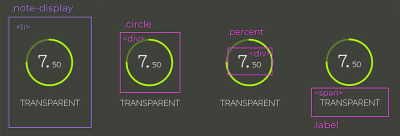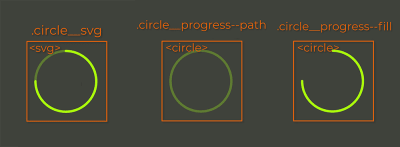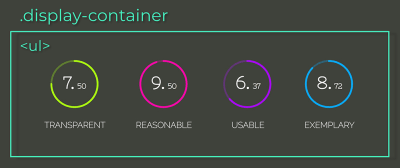翻译:疯狂的技术宅
原文:https://www.smashingmagazine....
本文首发微信公众号:jingchengyideng
欢迎关注,每天都给你推送新鲜的前端技术文章
摘要
在这篇文章中你将了解Awwwards网是怎样实现动画的。 本文介绍了HTML5 SVG中的circle 元素,它的stroke属性,以及如何使用CSS变量以及用 Vanilla JavaScript 为它们设置动画。
SVG是一种基于XML的,用于定义缩放矢量图形的标记语言。 它允许你通过在2D平面中确定的一组点来绘制路径、曲线和形状。 此外你还可以通过在这些路径上添加动态属性(例如笔触,颜色,粗细,填充等)来生成动画。
从2017年4月起,CSS Level 3 填充和描边模块开始支持从外部样式表设置SVG颜色和填充图案,而不是在每个元素上设置属性。 在本教程中,我们将会使用简单的纯十六进制颜色,不过填充和描边属性也支持图案,渐变和图像作为值。
注意:访问Awwwards网站时,你需要把浏览器宽度设置为1024px或更高的才能更好的查看动画显示。

文件结构
让我们从在终端中创建文件开始:
🌹 mkdir note-display
🌹 cd note-display
🌹 touch index.html styles.css scripts.jsHTML
这是连接css和js文件的初始模板:
<html lang="en">
<head>
<meta charset="UTF-8">
<title>Note Display</title>
<link rel="stylesheet" href="./styles.css">
</head>
<body>
<script src="./scripts.js"></script>
</body>
</html>每个note元素都包含一个列表项:li用于保存circle,note值及其label。

图:列出项元素及其直接子元素:.circle, .percent 和 .label
.circle_svg是一个SVG元素,它包含两个 <circle>元素。 第一个是要填充的路径,第二个用来为动画作准备。

图:SVG元素:SVG包装器和圆形标签
注释分为整数和小数,所以可以把它们设定为不同大小的字体。 label 是一个简单的<span>。 把所有得这些元素放在一起看起来像这样:
<li class="note-display">
<div class="circle">
<svg width="84" height="84" class="circle__svg">
<circle cx="41" cy="41" r="38" class="circle__progress circle__progress--path"></circle>
<circle cx="41" cy="41" r="38" class="circle__progress circle__progress--fill"></circle>
</svg>
<div class="percent">
<span class="percent__int">0.</span>
<span class="percent__dec">00</span>
</div>
</div>
<span class="label">Transparent</span>
</li>cx和cy属性定义圆的x轴和y轴中心点。 r属性定义其半径。
你可能已经注意到类名中的下划线/破折号模式。 这是BEM(block element modifier),分别代表 block, element 和 modifier。 它是使元素命名更加结构化、有条理和语义化的一种方法。
推荐阅读:什么是BEM以及为什么需要它
为了完成模板结构,让我们将四个列表项包装在无序列表元素中:

图:无序列表包装器拥有四个li子元素
<ul class="display-container">
<li class="note-display">
<div class="circle">
<svg width="84" height="84" class="circle__svg">
<circle cx="41" cy="41" r="38" class="circle__progress circle__progress--path"></circle>
<circle cx="41" cy="41" r="38" class="circle__progress circle__progress--fill"></circle>
</svg>
<div class="percent">
<span class="percent__int">0.</span>
<span class="percent__dec">00</span>
</div>
</div>
<span class="label">Transparent</span>
</li>
<li class="note-display">
<div class="circle">
<svg width="84" height="84" class="circle__svg">
<circle cx="41" cy="41" r="38" class="circle__progress circle__progress--path"></circle>
<circle cx="41" cy="41" r="38" class="circle__progress circle__progress--fill"></circle>
</svg>
<div class="percent">
<span class="percent__int">0.</span>
<span class="percent__dec">00</span>
</div>
</div>
<span class="label">Reasonable</span>
</li>
<li class="note-display">
<div class="circle">
<svg width="84" height="84" class="circle__svg">
<circle cx="41" cy="41" r="38" class="circle__progress circle__progress--path"></circle>
<circle cx="41" cy="41" r="38" class="circle__progress circle__progress--fill"></circle>
</svg>
<div class="percent">
<span class="percent__int">0.</span>
<span class="percent__dec">00</span>
</div>
</div>
<span class="label">Usable</span>
</li>
<li class="note-display">
<div class="circle">
<svg width="84" height="84" class="circle__svg">
<circle cx="41" cy="41" r="38" class="circle__progress circle__progress--path"></circle>
<circle cx="41" cy="41" r="38" class="circle__progress circle__progress--fill"></circle>
</svg>
<div class="percent">
<span class="percent__int">0.</span>
<span class="percent__dec">00</span>
</div>
</div>
<span class="label">Exemplary</span>
</li>
</ul>你必须先问一下自己 Transparent、 Reasonable、 Usable 和 Exemplary 标签都代表什么意思。 随着你对编程的不断熟悉,就会发现写代码不仅仅是为了能够使程序正常运行,还需要要确保它能够被长期维护和扩展。 这些只有在你的代码容易被修改时才能够实现。
“缩略词TRUE应该能够帮助你确定自己编写的代码是否能够适应未来的变化。”
那么,下次问问你自己:
透明:代码更改后果是否明确?
合理:成本效益值得吗?
可用:我是否能够在意外情况下重复使用它?
示例:它是否以高质量作为未来代码的示例?
-
Transparent(透明):代码在修改后果是否明确? -
Reasonable(合理):成本效益值得吗? -
Usable(可用):我是否能够在不同的场景下重复使用它? -
Exemplary(示例):未来它是否可以作为高质量作为代码范本?
注:Sandi Metz在《面向对象设计实践指南:Ruby语言描述》一书解释了TRUE和其他原则,以及如何通过设计模式实现它们。 如果你还没有开始研究设计模式,请考虑将此书放到自己的案头。
CSS
让我们导入字体并使其对所有内容生效:
@import url('https://fonts.googleapis.com/css?family=Nixie+One|Raleway:200');
* {
padding: 0;
margin: 0;
box-sizing: border-box;
}
box-sizing: border-box 属性中包括填充与边框值到元素的总宽度和高度,所以更容易计算图形的范围。
注意:有关 *box-sizing*的说明,请阅读“使用CSS Box让你更轻松”_。
body {
height: 100vh;
color: #fff;
display: flex;
background: #3E423A;
font-family: 'Nixie One', cursive;
}
.display-container {
margin: auto;
display: flex;
}通过组合规则显示:body 中的 flex 和 .display-container 中的 margin-auto,可以将子元素垂直水平居中。 .display-container元素也将作为一个 flex-container; 这样,它的子元素会沿主轴被放置在同一行。
.note-display 列表项也将是一个 flex-container。 由于有很多子项被居中,所以我们可以通过 justify-content 和 align-items 属性来完成。 所有 flex-items 都将垂直水平居中。 如果你不确定它们是什么,请查看“CSS Flexbox 可视化指南”中的对齐部分。
.note-display {
display: flex;
flex-direction: column;
align-items: center;
margin: 0 25px;
}让我们通过设置`stroke-width,stroke-opacity 和 stroke-linecap 将笔划应用于圆,这些规则会使画面动起来。 接下来,我们为每个圆添加一种颜色:
.circle__progress {
fill: none;
stroke-width: 3;
stroke-opacity: 0.3;
stroke-linecap: round;
}
.note-display:nth-child(1) .circle__progress { stroke: #AAFF00; }
.note-display:nth-child(2) .circle__progress { stroke: #FF00AA; }
.note-display:nth-child(3) .circle__progress { stroke: #AA00FF; }
.note-display:nth-child(4) .circle__progress { stroke: #00AAFF; }为了绝对定位百分比元素,必须完全知道这些概念是什么。 .circle元素应该是引用,所以让我们为其添加添加 position: relative 。
注意:对绝对定位更深入、直观的解释,请阅读“一劳永逸的理解 CSS Position”一文。
另一种使元素居中的方法是把 top: 50%, left: 50% 和 transform: translate(-50%, -50%); 组合在一起, 将元素的中心定位在其父级中心。
.circle {
position: relative;
}
.percent {
width: 100%;
top: 50%;
left: 50%;
position: absolute;
font-weight: bold;
text-align: center;
line-height: 28px;
transform: translate(-50%, -50%);
}
.percent__int { font-size: 28px; }
.percent__dec { font-size: 12px; }
.label {
font-family: 'Raleway', serif;
font-size: 14px;
text-transform: uppercase;
margin-top: 15px;
}到目前为止,模板应如该是下面这个样子:

图:完成的模板元素和样式
填充过渡
可以在两个圆形SVG属性的帮助下创建圆形动画:stroke-dasharray 和 stroke-dashoffset。
“stroke-dasharray 定义笔划中的虚线间隙模式。”
它最多可能需要四个值:
当它被设置为唯一的整数( stroke-dasharray:10 )时,破折号和间隙具有相同的大小;
对于两个值( stroke-dasharray:10 5 ),第一个应用于破折号,第二个应用于间隙;
第三种和第四种形式(stroke-dasharray:10 5 2 和 stroke-dasharray:10 5 2 3 )将产生各种样式的虚线和间隙。

图:stroke-dasharray属性值
左边的图像显示属性stroke-dasharray设置为 0 到圆周长度 238px。
第二个图像表示 stroke-dashoffset 属性,它抵消了dash数组的开头。 它的取值范围也是从0到圆周长度。

图:stroke-dasharray 和 stroke-dashoffset 属性
为了产生填充效果,我们将 stroke-dasharray 设置为圆周长度,以便它所有长度都能充满其冲刺范围而不留间隙。 我们也会用相同的值抵消它,这样会使它能够被“隐藏”。 然后,stroke-dashoffset 将更新为对应的说明文字,根据过渡持续时间填充其行程。
属性更新将通过CSS Variables在脚本中完成。 下面让我们声明变量并设置属性:
.circle__progress--fill {
--initialStroke: 0;
--transitionDuration: 0;
stroke-opacity: 1;
stroke-dasharray: var(--initialStroke);
stroke-dashoffset: var(--initialStroke);
transition: stroke-dashoffset var(--transitionDuration) ease;
}为了设置初始值并更新变量,让我们从使用 document.querySelectorAll 选择所有.note-display元素开始。 同时把 transitionDuration设置为900毫秒。
然后,我们遍历显示数组,选择它的 .circle__progress.circle__progress--fill 并提取HTML中的 r 属性集来计算周长。 有了它,我们可以设置初始的 --dasharray 和 --dashoffset 值。
当 --dashoffset 变量被 setTimeout 更新时,将发生动画:
const displays = document.querySelectorAll('.note-display');
const transitionDuration = 900;
displays.forEach(display => {
let progress = display.querySelector('.circle__progress--fill');
let radius = progress.r.baseVal.value;
let circumference = 2 * Math.PI * radius;
progress.style.setProperty('--transitionDuration', `${transitionDuration}ms`);
progress.style.setProperty('--initialStroke', circumference);
setTimeout(() => progress.style.strokeDashoffset = 50, 100);
});要从顶部开始过度,必须旋转 .circle__svg 元素:
.circle__svg {
transform: rotate(-90deg);
}

图:Stroke 属性转换
现在,让我们计算相对于 note 的dashoffset值。 note 值将通过 data-* 属性插入每个li项目。 * 可以替换为任何符合你需求的名称,然后可以通过元素的数据集在元数据集中检索:element.dataset.*。
注意:你可以在MDN Web Docs上得到有关 data-* 属性的更多信息。
我们的属性将被命名为 “data-note”:
<ul class="display-container">
+ <li class="note-display" data-note="7.50">
<div class="circle">
<svg width="84" height="84" class="circle__svg">
<circle cx="41" cy="41" r="38" class="circle__progress circle__progress--path"></circle>
<circle cx="41" cy="41" r="38" class="circle__progress circle__progress--fill"></circle>
</svg>
<div class="percent">
<span class="percent__int">0.</span>
<span class="percent__dec">00</span>
</div>
</div>
<span class="label">Transparent</span>
</li>
+ <li class="note-display" data-note="9.27">
<div class="circle">
<svg width="84" height="84" class="circle__svg">
<circle cx="41" cy="41" r="38" class="circle__progress circle__progress--path"></circle>
<circle cx="41" cy="41" r="38" class="circle__progress circle__progress--fill"></circle>
</svg>
<div class="percent">
<span class="percent__int">0.</span>
<span class="percent__dec">00</span>
</div>
</div>
<span class="label">Reasonable</span>
</li>
+ <li class="note-display" data-note="6.93">
<div class="circle">
<svg width="84" height="84" class="circle__svg">
<circle cx="41" cy="41" r="38" class="circle__progress circle__progress--path"></circle>
<circle cx="41" cy="41" r="38" class="circle__progress circle__progress--fill"></circle>
</svg>
<div class="percent">
<span class="percent__int">0.</span>
<span class="percent__dec">00</span>
</div>
</div>
<span class="label">Usable</span>
</li>
+ <li class="note-display" data-note="8.72">
<div class="circle">
<svg width="84" height="84" class="circle__svg">
<circle cx="41" cy="41" r="38" class="circle__progress circle__progress--path"></circle>
<circle cx="41" cy="41" r="38" class="circle__progress circle__progress--fill"></circle>
</svg>
<div class="percent">
<span class="percent__int">0.</span>
<span class="percent__dec">00</span>
</div>
</div>
<span class="label">Exemplary</span>
</li>
</ul>parseFloat方法将display.dataset.note返回的字符串转换为浮点数。 offset 表示达到最高值时缺失的百分比。 因此,对于 7.50 note,我们将得到 (10 - 7.50) / 10 = 0.25,这意味着 circumference 长度应该偏移其值的25%:
let note = parseFloat(display.dataset.note);
let offset = circumference * (10 - note) / 10;更新scripts.js:
const displays = document.querySelectorAll('.note-display');
const transitionDuration = 900;
displays.forEach(display => {
let progress = display.querySelector('.circle__progress--fill');
let radius = progress.r.baseVal.value;
let circumference = 2 * Math.PI * radius;
+ let note = parseFloat(display.dataset.note);
+ let offset = circumference * (10 - note) / 10;
progress.style.setProperty('--initialStroke', circumference);
progress.style.setProperty('--transitionDuration', `${transitionDuration}ms`);
+ setTimeout(() => progress.style.strokeDashoffset = offset, 100);
});

sroke属性转换为note值
在继续之前,让我们将stoke转换提取到它自己的方法中:
const displays = document.querySelectorAll('.note-display');
const transitionDuration = 900;
displays.forEach(display => {
- let progress = display.querySelector('.circle__progress--fill');
- let radius = progress.r.baseVal.value;
- let circumference = 2 * Math.PI * radius;
let note = parseFloat(display.dataset.note);
- let offset = circumference * (10 - note) / 10;
- progress.style.setProperty('--initialStroke', circumference);
- progress.style.setProperty('--transitionDuration', `${transitionDuration}ms`);
- setTimeout(() => progress.style.strokeDashoffset = offset, 100);
+ strokeTransition(display, note);
});
+ function strokeTransition(display, note) {
+ let progress = display.querySelector('.circle__progress--fill');
+ let radius = progress.r.baseVal.value;
+ let circumference = 2 * Math.PI * radius;
+ let offset = circumference * (10 - note) / 10;
+ progress.style.setProperty('--initialStroke', circumference);
+ progress.style.setProperty('--transitionDuration', `${transitionDuration}ms`);
+ setTimeout(() => progress.style.strokeDashoffset = offset, 100);
+ }
注意增长值
还有一件事就是把 note 从0.00转换到要最终的 note 值。 首先要做的是分隔整数和小数值。 可以使用字符串方法split()。 之后它们将被转换为数字,并作为参数传递给 increaseNumber() 函数,通过整数和小数的标志正确显示在对应元素上。
const displays = document.querySelectorAll('.note-display');
const transitionDuration = 900;
displays.forEach(display => {
let note = parseFloat(display.dataset.note);
+ let [int, dec] = display.dataset.note.split('.');
+ [int, dec] = [Number(int), Number(dec)];
strokeTransition(display, note);
+ increaseNumber(display, int, 'int');
+ increaseNumber(display, dec, 'dec');
});在 increaseNumber() 函数中,我们究竟选择 .percent__int 还是 .percent__dec 元素,取决于 className ,以及输出是否应包含小数点。 接下来把transitionDuration设置为900毫秒。 现在,动画表示从0到7的数字,持续时间必须除以note 900 / 7 = 128.57ms。 结果表示每次增加迭代将花费多长时间。 这意味着 setInterval将每隔 128.57ms 触发一次。
设置好这些变量后,接着定义setInterval。 counter 变量将作为文本附加到元素,并在每次迭代时增加:
function increaseNumber(display, number, className) {
let element = display.querySelector(`.percent__${className}`),
decPoint = className === 'int' ? '.' : '',
interval = transitionDuration / number,
counter = 0;
let increaseInterval = setInterval(() => {
element.textContent = counter + decPoint;
counter++;
}, interval);
}
图:计数增长
太酷了! 确实增加了计数值,但它在无限循环播放。 当note达到我们想要的值时,还需要清除setInterval。 可以通过clearInterval函数完成:
function increaseNumber(display, number, className) {
let element = display.querySelector(`.percent__${className}`),
decPoint = className === 'int' ? '.' : '',
interval = transitionDuration / number,
counter = 0;
let increaseInterval = setInterval(() => {
+ if (counter === number) { window.clearInterval(increaseInterval); }
element.textContent = counter + decPoint;
counter++;
}, interval);
}
图:最终完成
现在,数字更新到note值,并使用clearInterval()函数清除。
教程到此就结束了,希望你能喜欢它!
如果你想开发一些更具互动性的东西,请查看使用 Vanilla JavaScript 创建的Memory Game Tutorial 。 它涵盖了基本的HTML5,CSS3和JavaScript概念,如定位、透视、转换、Flexbox、事件处理、超时和三元组。
祝你快乐的编码!🌹
本文首发微信公众号:jingchengyideng
欢迎扫描二维码关注公众号,每天都给你推送新鲜的前端技术文章

**粗体** _斜体_ [链接](http://example.com) `代码` - 列表 > 引用。你还可以使用@来通知其他用户。